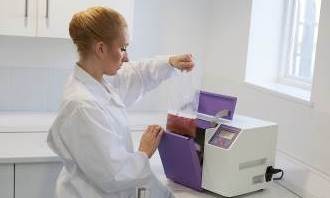
Products from the Seward range of Stomacher paddle blenders have been used in USDA meat specification protocols.
Following on from high profile meat provenance scares, Seward claims that there has been an increase in enquiries on the application of its technology for the delivery of contamination free, viable antigen samples.
Meat speciation has been carried out for a number of years on cooked and uncooked samples using ELISA based techniques.
The Stomacher can play an important role in both protocols for the extraction of the required antigens for subsequent analysis.
The USDA method applies two ELISA techniques supplied by ELISA-TEK for cooked meats. Raw meats are tested using DTEK Immunosticks or Tepnel Biosystems F.A.S.T. Immmunosticks. Positive samples are cooked and retested for confirmation using ELISA-TEK.
The sensitivity of the test protocol requires that the samples be handled with the utmost care to prevent cross contamination in the laboratory.
The Stomacher bag prevents this risk by containing the sample throughout the preparation process.
The paddle action of the Stomacher produces a reproducible sample without any heat or shearing damage which could potentially damage cell components.
Stomacher has a wide range of applications in food chemistry, as well as its traditional role in microbiology. It provides an alternative in applications where rotating blades are unsuitable and potentially harmful to the sample under test.


